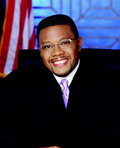 By Judge Greg Mathis By Judge Greg Mathis
More than 40 million Americans are uninsured and cannot afford basic health care services. The majority of them are black or Latino and are children or seniors. Because they lack the resources, many of these families and individuals have to often decide between paying the gas bill and seeing the doctor about a nagging cough or other ailment. It’s unfortunate that, in a country so full of resources, so many of our residents have to make such choices.
There are options, though; options that benefit the uninsured, doctors and, ultimately, the tax payer.
Community health centers are one of the most effective options available to uninsured and low-income patients. It’s time more folks knew about and utilized them and it’s time more doctors committed their time and talents to building up such services.
Community health centers provide health care regardless of a patient’s ability to pay. These centers serve over 14 million uninsured and low-income patients who otherwise might not receive treatment for their high blood pressure or diabetes, vaccinations or other medical services. Recent studies have shown that hospitals over charge the uninsured to make up for the millions of dollars they lose each year in unpaid medical bills. As a result, an insured or poor patient may receive a bill three times higher than the one an insured patient receives, even when the illness and treatment are the same. Given this disturbing fact, it is clear that health care centers ultimately protect low-income patients from the squeeze of corporate hospitals.
Despite the many benefits to the community, health care centers don’t reach far or wide enough. This must change. Less than a third of those who need free medical services actually seek treatment at community health centers. Though the number of patients at the centers has increased by 200 percent since 2000 – a good thing; the increase shows word about the centers is spreading – there are millions more who go untreated each year.
Demand for the services the health care centers offer is much greater that the number of doctors available to provide them. The National Health Service Corporation (NHSC) recruits doctors and other health care professionals to work in poor and underserved communities. They also provide scholarships and loan repayments for graduates who work in poor communities.
More doctors and nurses should consider working with NHSC, either full-time or part-time or on a volunteer basis, to ensure these health care centers can continue to grow. The NHSC provides a perfect opportunity for medical professionals of color to give back to their communities. Community organizations can work with the community health centers to help spread the word about their services on a grassroots level, distributing flyers and other materials on behalf the centers. Churches can point their congregations to the centers in their neighborhood.
The current healthcare system does not work for every American. Until universal healthcare is made available to each and every one of us, community health centers are needed to ensure even the poorest American can get the medical treatment they need and deserve.
Editor’s note: Judge Greg Mathis is national vice president of Rainbow PUSH and a national board member of the Southern Christian Leadership Conference.
Return To Top |
